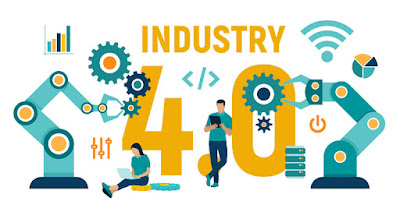The impact of industry 4.0 on bearing production
The fourth industrial revolution, or Industry 4.0, is transforming the global manufacturing industry through the integration of advanced technologies such as artificial intelligence, the Internet of Things, robotics, and automation. This transformation is facilitating improved productivity, efficiency, and quality across a range of industries, including bearing production. Bearings are critical components in various types of machinery and equipment, from automobiles and airplanes to wind turbines and medical devices. As Industry 4.0 technologies continue to gain momentum, bearing manufacturers are embracing these advancements to enhance their production processes and product quality.
The impact of Industry 4.0 on bearing production is significant, providing manufacturers with opportunities to innovate and optimize their operations at a time when competition is intensifying. By adopting advanced technologies, bearing manufacturers can optimize their production processes, reduce costs, improve quality and speed up deliveries, which ultimately leads to improved customer satisfaction. This blog post will explore the different ways that Industry 4.0 is revolutionizing the bearing production process and the benefits
1. Introduction to Industry 4.0 and its impact on bearing production
The introduction of Industry 4.0 has brought about significant technological advancements in various industries, including manufacturing. Several new technologies such as the Internet of Things (IoT), Artificial Intelligence (AI), big data, and automation have revolutionized the entire production process. In this context, this document aims to explore the impact of Industry 4.0 on the bearing production industry. Bearings play a vital role in various applications, including the automotive, aerospace, and healthcare industries. With the adoption of Industry 4.0 technologies, the bearing production process has become more efficient, flexible, and cost-effective. Advancements such as predictive maintenance, condition monitoring, and real-time tracking have not only improved the overall productivity but also increased the quality of the final product. Additionally, Industry 4.0 has enabled the bearing production industry to provide better customer service by providing real-time feedback and customization options. This document will discuss the major areas where Industry 4.0 technologies have impacted the bearing production industry and the challenges that need to be addressed to ensure optimal utilization of these advancements.
2. Automation and smart manufacturing processes in bearing production
The fourth industrial revolution, or Industry 4.0, is characterized by the integration of advanced technologies and the internet of things with traditional manufacturing processes. Within the bearing industry, Industry 4.0 is manifesting in the form of automation and smart manufacturing processes. These advancements have significantly impacted bearing production, resulting in improvements in quality, efficiency, and cost-effectiveness. Automation has increased the accuracy and consistency of manufacturing processes while reducing the dependence on skilled labor. Smart manufacturing, on the other hand, has enabled real-time monitoring of operations and the collection of critical data throughout the production process. These technologies have helped to reduce downtime and improve overall equipment effectiveness, allowing companies to produce high-quality bearings at a lower cost. As the industry continues to evolve, it is expected that the implementation of Industry 4.0 technologies will become increasingly widespread, leading to further improvements in bearing production.
3. The role of data analytics and predictive maintenance in improving bearing quality
In the world of bearing production, the Fourth Industrial Revolution (Industry 4.0) has brought tremendous advancements in the manufacturing process. One key area of improvement is the role of data analytics and predictive maintenance in ensuring the quality of bearings. By utilizing data analytics, manufacturers can collect and analyze data on the performance of bearings to identify potential defects or failures. Predictive maintenance can then be implemented to address these issues before they have a greater impact on the overall production process. This not only improves the quality of bearings but also reduces maintenance costs and downtime. As Industry 4.0 continues to evolve, the integration of data analytics and predictive maintenance will become increasingly important in bearing production.
4. Enhancing supply chain management through digitalization and real-time tracking
One of the significant benefits of Industry 4.0 is enhancing supply chain management through digitalization and real-time tracking. This is particularly important for bearing production since it enables us to track real-time inventories, reduce lead times, and optimize production scheduling. By using digital technologies, bearing manufacturers can streamline their production processes to improve efficiency and reduce costs. For instance, supply chain management software allows manufacturers to monitor the status of raw materials and finished goods, making it easier to avoid stockouts and overstocking. Moreover, the use of real-time tracking reduces the need for manual tracking, which can lead to errors and inefficiencies. With the increased adoption and integration of these technologies, the bearing industry can realize significant improvements in supply chain efficiency, agility, and responsiveness. As a result, manufacturers can meet customer demands more effectively and provide high-quality products at competitive prices.
5. The concept of Industry 4.0
The significance of the number 5 in bearing production lies in the concept of Industry 4.0. As manufacturers adjust to this new era of industrial automation and data exchange, known as the fourth industrial revolution, they are also embracing the five essential components of Industry 4.0: connectivity, data integration, intelligent systems, self-optimization, and agility. These components are transforming the way bearings are produced, from the initial design and development processes to the final production and quality control stages. As bearing manufacturers incorporate these advanced technologies, they are able to increase productivity, reduce downtime, and deliver higher quality products to their customers.
In conclusion, the fourth industrial revolution or Industry 4.0 has significantly impacted bearing production by digitizing and automating various processes. The use of smart sensors, internet of things (IoT), and analytics has made the production process efficient and has minimized the rate of errors. Additionally, Industry 4.0's emphasis on data collection and analysis has enabled manufacturers to leverage big data to optimize their operations and ferret out new business opportunities. Bearing producers must adjust to these technological advances and integrate them into their manufacturing processes if they are to remain competitive in the ever-changing landscape of the modern industrial sector.




Megjegyzések
Megjegyzés küldése